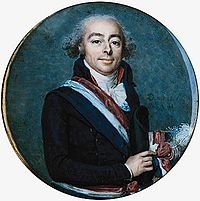François Antoine de Boissy d'Anglas
|
Count François Boissy d'Anglas |
|
|---|---|

François Boissy d'Anglas by François Dumont (1795, Louvre Palace)
|
|
| Peer of France | |
|
In office August 1815 – 20 October 1826 |
|
| Monarch |
Louis XVIII Charles X |
| Member of Conservative Senate | |
|
In office 18 February 1804 – 14 April 1814 |
|
| Monarch | Napoleon I |
| Member of the Council of Five Hundred | |
|
In office 2 November 1795 – 5 September 1797 |
|
| Constituency | Ardèche |
| Member of National Convention | |
|
In office 20 September 1792 – 2 November 1795 |
|
| Constituency | Ardèche |
|
Member of the Estates-General for the Third Estate |
|
|
In office 7 January 1789 – 9 July 1789 |
|
| Constituency | Annonay |
| Personal details | |
| Born |
8 December 1756 Saint-Jean-Chambre, France |
| Died | 20 October 1826 (aged 69) Paris, France |
| Nationality | French |
| Political party |
Girondist (1792–1793) Maraisard (1793–1795) Clichyens (1795–1797) Independent (1799–1826) |
| Spouse(s) | Marie-Françoise Michel (m. 1766–1828); his death |
| Children | 4 children |
| Profession | Writer, lawyer |
| Religion | Calvinism |
François-Antoine, Count of Boissy d'Anglas (1756 – 1828) was a French writer, lawyer and politician during the Revolution and the Empire.
Born to a Protestant family in Saint-Jean-Chambre, Ardèche, he studied Law and, after literary attempts, became a lawyer to the parlement of Paris.
In 1789 he was elected by the Third Estate of the sénéchaussee of Annonay as deputy to the Estates-General. He was one of those who induced the Estates-General to proclaim itself a National Assembly on 17 June 1789, and approved, in several speeches, of the storming of the Bastille and of the taking of the royal family to Paris (October 1789).
Boissy d'Anglas demanded that strict measures be taken against the Royalists who were conspiring in Southern France, and published some pamphlets on financial issues. During the Legislative Assembly, he was procureur-syndic for the directory of the département of Ardèche.
Elected to the National Convention, he sat in the centre, le Marais, voting in the trial of Louis XVI for his detention until deportation should be judged expedient for the state. He was then representative on mission to Lyon, charged with investigating frauds in connection with the supplies of the Army of the Alps.
...
Wikipedia
